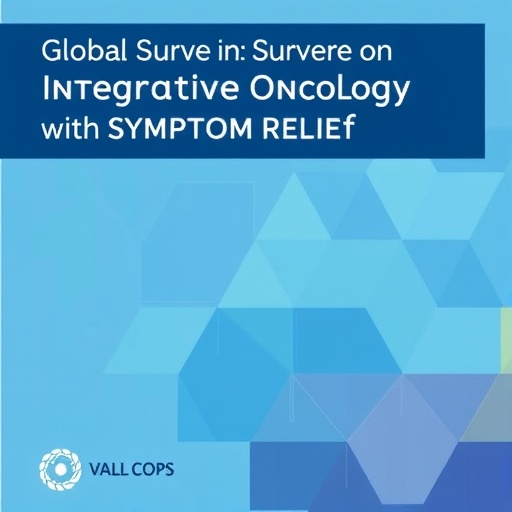In the realm of cancer treatment, the comprehensive approach has emerged as a pivotal strategy. Recognizing that patients face a multitude of symptoms not solely attributable to the disease itself, but also as side effects of conventional treatments, the integration of supportive care modalities has gained traction. A recent global survey conducted by a coalition of experts, including scholars such as Chan, Nasr, and Arcos, delves deep into the various integrative modalities employed across the globe for symptom management in oncology. This expansive research embodies the synergy of expertise, highlighted within the guidelines set forth by the Multinational Association of Supportive Care in Cancer (MASCC) and the Society for Integrative Oncology (SIO).
The survey represents a significant effort in understanding how different therapeutic options are perceived and utilized worldwide. As cancer treatments evolve, patients increasingly seek complementary therapies that promise reduction in symptom burden while enhancing overall quality of life. This growing inclination is not just a whim but a response to a palpable need for holistic cancer care. Accordingly, the research undertaken by Chan and colleagues illuminates this dynamic interplay between conventional oncology and integrative strategies.
Participants in the survey were drawn from a broad spectrum of healthcare professionals who engage directly with oncology patients. By collating their insights and practical experiences, the researchers were able to paint a comprehensive picture of current practices and attitudes towards integrative oncology. This feedback is crucial, as it reveals gaps in knowledge and areas for improvement, driving future initiatives aimed at refining treatment protocols and guidelines that accommodate both traditional and complementary therapies.
Among the various modalities that surfaced from the evaluation, acupuncture, massage therapy, and nutritional interventions stood out as the most frequently reported complementary approaches. Each of these therapies has its own merit and anecdotal history within the oncology community, yet their efficacy often hinges on individual patient scenarios and specific symptomatology. Acupuncture, for instance, is renowned for its ability to alleviate pain and nausea among cancer patients, yet its implementation varies considerably depending on geographic and cultural contexts.
Moreover, the researchers noted a significant variability in how these therapies are integrated into standard care routines. In some regions, there is a robust framework supporting complementary treatment, whereas in others, traditional oncology models predominate, with little to no room for integrative approaches. This disparity not only affects patient care but also highlights a critical need for standardized protocols that recognize the therapeutic potentials of these approaches within mainstream oncology.
Additionally, the findings underscore the importance of patient education regarding available options. Many patients may be unaware of complementary therapies that could provide relief from distressing symptoms associated with their treatment. This lack of awareness can lead to missed opportunities for symptom management and ultimately detracts from overall patient satisfaction and wellbeing. Therefore, the survey highlights an urgent need for healthcare providers to foster open dialogues with patients about all available treatment avenues.
As the field of integrative oncology continues to expand, rigorous research efforts like this survey play an essential role in shaping its future. By establishing a solid foundation of evidence-based practices, healthcare practitioners can confidently recommend complementary therapies that have been demonstrated to enhance patient outcomes. Thus, the survey acts not only as a reflection of current practices but as a catalyst for future research, ensuring that evidence informs practice yet remains adaptable to the unique needs of individuals.
One prominent observation from the study pertains to the role of cultural beliefs in shaping attitudes towards complementary therapies. Region-specific traditions often influence the popularity and acceptance of various modalities, suggesting that healthcare professionals must consider cultural contexts when recommending integrative therapies. For instance, in cultures with a strong traditional medicine background, patients might be more inclined to pursue herbal remedies and alternative treatments as part of their cancer care, whereas in more Westernized settings, evidence-backed integrative approaches might see greater acceptance.
Furthermore, this research paves the way for enhanced interdisciplinary collaboration between oncologists, nutritionists, psychologists, and practitioners of complementary therapies. A multidisciplinary approach fosters a holistic treatment paradigm that not only focuses on the disease but also on the patient’s emotional and psychological needs. Creating a collaborative environment can minimize treatment-related distress and promote coping strategies that enhance quality of life during cancer treatment.
Moreover, the researchers emphasize the importance of regulatory oversight in ensuring that complementary therapies are administered safely and effectively. Concerns regarding the standardization of these practices, as well as the qualification of practitioners, should be addressed to prevent potential risks that may arise from unregulated therapies. Establishing guidelines for the safe implementation of integrative therapies will be paramount going forward, ensuring that patients receive care that is both attentive and informed.
In conclusion, the extensive survey illuminated critical considerations regarding symptom management through integrative oncology modalities. It offers insight not merely into present practices but also into tangible next steps the oncological community can take to refine and enhance patient care. As integrative oncology continues to grow, remaining attentive to the voices of healthcare providers and patients alike will champion a future where symptom management transcends traditional boundaries, fostering an environment of empathy, support, and healing.
This innovative study and its revelations underscore the evolving landscape of cancer care, emphasizing the necessity of a comprehensive, patient-centric approach. As more research emerges, the integration of complementary therapies into standard oncology practice holds the promise of advancing the quality of life for countless cancer patients worldwide.
Subject of Research: Integrative oncology modalities for symptom management
Article Title: Evaluation of integrative oncology modalities for symptom management: a MASCC/SIO global survey.
Article References: Chan, A., Nasr, R., Arcos, D. et al. Evaluation of integrative oncology modalities for symptom management: a MASCC/SIO global survey. BMC Complement Med Ther 25, 406 (2025). https://doi.org/10.1186/s12906-025-05157-6
Image Credits: AI Generated
DOI: https://doi.org/10.1186/s12906-025-05157-6
Keywords: Integrative oncology, symptom management, complementary therapies, MASCC, SIO, patient care, acupuncture, massage therapy, nutritional interventions, multidisciplinary collaboration, cultural beliefs, regulatory oversight.




